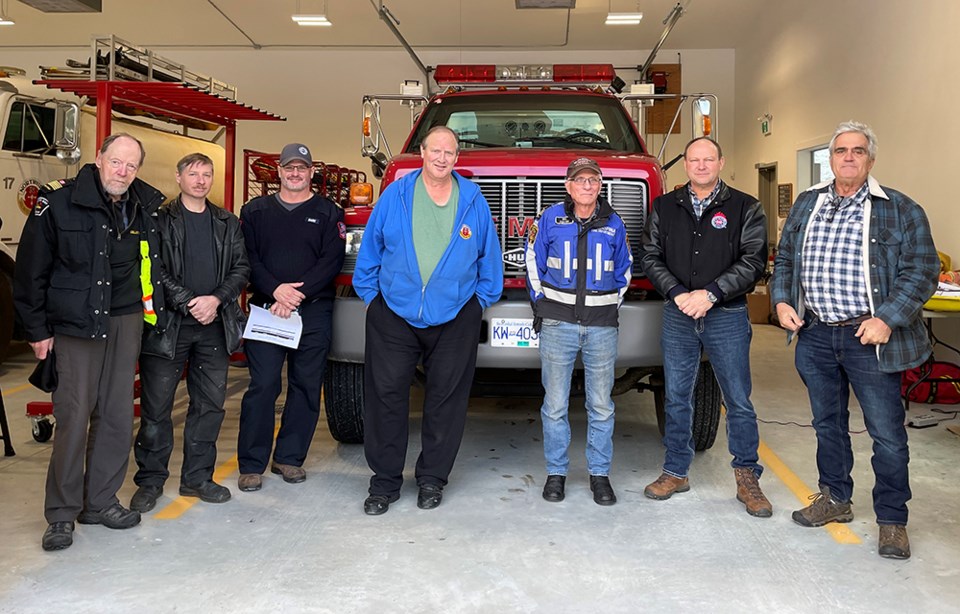Recruitment and retention of firefighters was an important topic of discussion during the recent quarterly meeting between fire chiefs representing various fire departments throughout the qathet region.
Powell River Fire Rescue chief Terry Peters said it can be difficult to recruit paid on-call firefighters, who are needed by all departments.
“In emergency services, we struggle – we all do,” said Peters, adding that this is what keeps fire chiefs in the region awake at night. He said that at meetings such as the one recently concluded, the fire chiefs work to help each other with issues such as staffing.
One big advantage for fire departments here is the mutual aid agreement, where a fire chief can call in firefighters from another department if warranted.
“Disasters have no boundaries and we have to rely on each other,” said Peters. “We have to help each other and make sure our training standards are all up to snuff and that we have enough people who are trained to do the jobs. We need people.”
Malaspina Volunteer Fire Department chief Dave Keiver said his department has picked up five people in the last couple of months but recruitment, especially during the pandemic, has been generally difficult.
Keiver said three of the five new firefighters work out of town for periods of time and come back, making it difficult to keep training fluid. Firefighters in his department are not volunteers, but rather, are paid-on call, he added.
“They are firefighters,” said Keiver. “The training is the same as for career firefighters and they use the same tools and equipment.”
Keiver said that during the height of COVID-19, his fire department had to shut down training, which made it more difficult to keep skills current.
“When it came back it was disjointed and we’re still recovering from it,” he added.
Keiver said on paper, he has 32 firefighters, but some are on leaves of absence. He said that during the day, most firefighters are at their jobs, so they sometimes can’t respond.
It takes commitment and dedication to the community to be a firefighter, added Keiver. He’s in his 45th year with the department and finds it rewarding.
“When I joined, the manpower wasn’t the problem, the lack of equipment was the issue,” said Keiver. “Now, it has sort of flipped right over. We have the equipment. We just need the bodies to run it.”
Keiver, similar to Peters, mentioned the mutual aid agreement, demonstrating the high level of cooperation between fire departments in the region. At a sawmill fire, he said he had the equipment but not enough firefighters, so he contacted Powell River Fire Rescue, which dispatched some firefighters to the scene.
“It worked out just wonderfully,” said Keiver.
He said the shortage of firefighters is a North America-wide problem.
“We’re working hard with the regional district to come up with incentives to make it more attractive and appealing,” said Keiver. He added that there is a small benefit package for his members, and members are also paid when they are out on call.
Training takes time
Gillies Bay Volunteer Fire Department fire chief Rob McWilliam said one of the issues is that some people find the work-life experience means they can no longer serve as a firefighter. He said from 2020 to the current time, there has been a turnover of half the membership.
“When you are trying to train people, it takes at least a year to provide the basic training,” said McWilliam. “You try to juggle training for those who are more experienced with the people who know nothing. It’s complicated.
“Some of our long-term members have now packed it in. We’ve lost some incredibly valuable expertise. You don’t replace those kinds of people overnight. You lose critical leadership in the department.”
McWilliam said the service by firefighters helps the community, and people join because they want to be of service to the community.
He said his name and number is on the bulletin board outside the fire hall so interested parties can contact him.
Gord Schreiner, fire chief, Comox Fire Rescue, said recruitment and retention issues are not specific to qathet.
“The recruitment and retention piece is systemic across the country, and perhaps across all of North America,” said Schreiner. “There are many reasons for that. It’s becoming a bit of a challenge for most fire departments.”
Schreiner’s department is comprised of six paid staff serving a “a fairly significant population,” and around 50 paid on-call members.
“We certainly rely on our paid on-call model for the majority of our service,” said Schreiner. “Even during the day, we need paid on-call to help us. If we had a call right now, we would hit pagers and wait for two or three volunteers to show up to load the truck and get going.”
Schreiner said that turnover of paid on-call members in his department is higher than in the past, with about 12 members a year leaving, in an organization that takes two years to train people.
“If you do the math, half of our people are not as trained as we’d like them to be, and training is expensive,” added Schreiner.
His department covers a population of 23,000 residents and responded to 950 calls in 2022. Powell River Fire Rescue covers around 13,000 residents; expected calls from 2022 are expected to total 1,200 when tallied.
To become a paid on-call firefighter in City of Powell River, interested parties can go to powellriver.ca and find employment opportunities. Alternatively, there is practice on Tuesday nights at the fire hall and everyone is welcome, said Peters.
People who are interested in becoming a paid on-call firefighter for the regional departments can go to qathet.ca and find fire protection services in emergency services.



